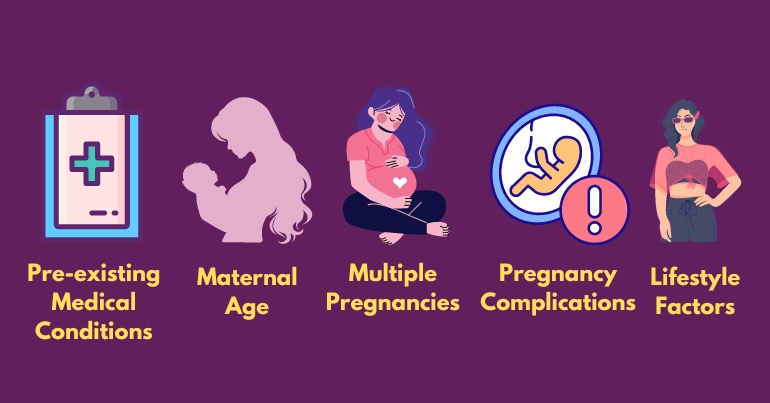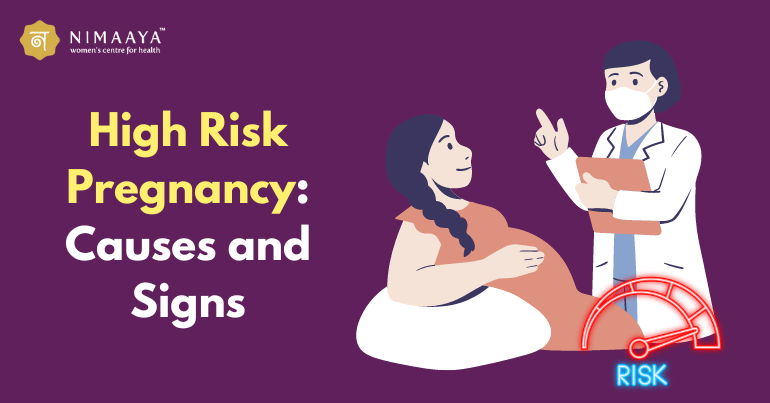Introduction
Pregnancy is often a time of joy and anticipation, but for some, it comes with added concerns and complications. A high risk pregnancy can pose significant challenges for both the mother and the baby, requiring specialized care and attention. This article will provide comprehensive insights into high-risk pregnancies, ensuring you are well informed and prepared to navigate this critical period with confidence.
What is a High Risk Pregnancy?
A high risk pregnancy is one in which there is a higher likelihood of health issues for the mother or the unborn child before, during, or following delivery. The high risk pregnancy definition encompasses various conditions and factors that elevate the potential for complications. These can range from pre-existing health conditions of the mother to issues that develop during pregnancy, such as gestational diabetes or preeclampsia. Recognizing that a pregnancy is serious allows for proactive management and care, which can significantly improve outcomes.
Identifying Signs of High Risk Pregnancy
Being aware of the warning signs of a high risk pregnancy is crucial for ensuring timely medical intervention and preventing serious complications. Recognizing these signs early can significantly improve outcomes for both the mother and baby. Here are some key warning signs to watch out for, along with detailed explanations:
• Severe Abdominal Pain:
Persistent or severe abdominal pain is a critical warning sign. This pain can indicate serious issues such as placental abruption, where the placenta detaches from the uterus prematurely, or preterm labor, where labor begins before the baby is fully developed. Both conditions require immediate medical attention to prevent complications for the mother and baby.
• Heavy Bleeding:
While light spotting can be a normal part of pregnancy, heavy bleeding is a cause for concern and necessitates prompt medical evaluation. Heavy bleeding can be a sign of miscarriage, placental problems, or other complications that need to be addressed immediately to protect the health of both the mother and the fetus.
• Severe Headaches:
Experiencing chronic or severe headaches, especially when accompanied by visual disturbances such as blurred vision or seeing spots, can be indicative of preeclampsia. Preeclampsia is a serious condition characterized by high blood pressure and can lead to significant complications if not treated promptly. Monitoring blood pressure and reporting severe headaches to a healthcare provider is essential.
• Sudden Swelling:
Sudden or severe swelling in the hands, feet, or face is another potential symptom of preeclampsia. This swelling, also known as edema, can occur due to the body’s increased fluid retention and is often associated with elevated blood pressure. Noticing unusual swelling and seeking medical advice can help manage preeclampsia effectively.
• Decreased Fetal Movement:
A noticeable reduction in the baby’s movements can indicate fetal distress, which might be caused by various factors such as insufficient oxygen or nutrients. It’s important to monitor the baby’s movements and report any significant decrease to a healthcare provider immediately. Regular check-ups and ultrasounds can help assess the baby’s well-being and address any issues promptly.
By understanding and recognizing these warning signs, expectant mothers and their families can take proactive steps to seek medical intervention when necessary. Early detection and treatment are key to managing a serious pregnancy effectively and ensuring the health and safety of both the mother and the baby.
Also Read: Top 5 Gynecologists in Ahmedabad: Your Complete Guide to Finding the Best Care
Understanding Causes of High Risk Pregnancy

• Pre-existing Medical Conditions:
Pre-existing medical conditions such as hypertension, diabetes, thyroid disorders, and heart diseases can lead to a serious pregnancy. These conditions need careful monitoring and management throughout the pregnancy to ensure the health of both the mother and the baby. Such conditions can significantly influence the serious pregnancy causes.
• Maternal Age:
Both younger and older maternal ages can contribute to a serious pregnancy. Women under the age of 17 and those over the age of 35 have higher chances of experiencing complications during pregnancy. Advanced maternal age, in particular, is often associated with a higher likelihood of genetic abnormalities and other pregnancy-related issues, which are common serious pregnancy causes.
• Multiple Pregnancies:
Carrying more than one fetus, such as twins or triplets, can increase the trouble of complications, making it high-risk for pregnancy. Multiple pregnancies often lead to preterm birth, low birth weight, and other complications, which are significant factors in determining the serious pregnancy causes.
• Pregnancy Complications:
Issues that arise during pregnancy, such as gestational diabetes, preeclampsia, and placenta previa, can classify the pregnancy as high trouble. These complications need to be closely monitored and managed by healthcare professionals to prevent further risks. The presence of such complications is a key element in understanding the causes of serious pregnancy.
• Lifestyle Factors:
Certain lifestyle choices and behaviors can contribute to a serious pregnancy. Smoking, alcohol consumption, and drug use during pregnancy can lead to serious health issues for both the mother and the baby, contributing to serious pregnancy causes. Additionally, inadequate prenatal care and poor nutrition can also elevate the risk.
• Previous Pregnancy Issues:
A history of previous pregnancy complications, such as preterm birth, stillbirth, or miscarriages, can increase the trouble of subsequent pregnancies. Women who have experienced such issues are more likely to be classified under serious pregnancy, as their previous experiences are significant indicators of potential future complications.
By understanding these causes of high risk pregnancy, expecting mothers and healthcare providers can take proactive measures to manage and mitigate risks, ensuring a safer pregnancy journey.
Exploring List of Pregnancy Risk Factors
Understanding pregnancy risk factors is essential for the early identification and management of trouble pregnancies. Recognizing these factors can help healthcare providers and expectant mothers take necessary precautions and ensure the best possible outcomes. Here are some of the most common pregnancy risk factors that contribute to a high risk pregnancy list:
○ Advanced Maternal Age:
Women over the age of 35 are more likely to experience complications such as gestational diabetes, hypertension, and chromosomal abnormalities in the baby. These risks necessitate closer monitoring and specialized care during pregnancy.
○ Young Maternal Age:
Teenage mothers face higher risks due to incomplete physical development and socio-economic challenges. Young maternal age can lead to complications such as preterm birth and low birth weight, making it crucial to provide adequate prenatal care and support.
○ Obesity:
Excessive weight increases the likelihood of complications such as gestational diabetes, preeclampsia, and difficulties during labor. Managing weight through a healthy diet and regular exercise can help mitigate these risks and promote a healthier pregnancy.
○ Multiple Pregnancies:
Carrying more than one baby, such as twins or triplets, raises the risk of preterm birth and other complications. Multiple pregnancies place additional strain on the mother’s body, requiring more frequent check-ups and specialized medical attention.
○ Previous Pregnancy Complications:
A history of preterm birth, miscarriage, or stillbirth increases the chances of experiencing a high risk pregnancy in the future. Women with previous pregnancy complications need to receive thorough prenatal care and monitoring to address potential issues early on.
By understanding these factors of pregnancy trouble, expectant mothers and their healthcare providers can better prepare for and manage high-risk pregnancies. Awareness and proactive care are key to ensuring the health and well-being of both the mother and the baby throughout the pregnancy journey.
Also Read: Discover the Top 5 IVF Centers in Ahmedabad for IVF Journey
Managing a High Risk Pregnancy
Proper management of a serious pregnancy involves a multidisciplinary approach, often requiring the expertise of obstetricians, perinatologists, and other specialists. Key management strategies include:
- Regular Prenatal Visits and Frequent check-ups are vital to monitor the health of both mother and baby.
- Specialized Testing or Advanced tests like ultrasounds, blood tests, and amniocentesis help in detecting and managing potential issues early.
- Medication Management or Adjustments to existing medications or the introduction of new ones can be necessary to maintain maternal health and fetal development.
- Making Lifestyle Adjustments like Adopting a healthy lifestyle, including a balanced diet, regular exercise, and avoiding harmful substances, is crucial.
Conclusion:-
A high risk pregnancy requires careful monitoring and management to ensure the best possible outcomes for both the mother and the baby. With the support of specialized care providers like Nimaaya IVF Center and experts like Dr. Birva Dave, women can face high-risk pregnancies with confidence and hope.
Remember, early detection and proactive management are key to ensuring a healthy pregnancy and a safe delivery. If you or someone you know is at risk, seek medical advice and support to ensure the best possible care.
-:FAQs:-
1) How can I determine if my pregnancy is considered high-risk?
Answer:- To determine if your pregnancy is high-risk, your healthcare provider will evaluate various factors such as your medical history, age, lifestyle, and any existing health conditions. Regular prenatal visits and specialized tests will help assess any potential risks. If you have conditions like hypertension, or diabetes, or if you’re expecting multiples, your pregnancy might be classified as high-trouble.
2) What are the common warning signs of a high risk pregnancy that I should watch out for?
Answer:- Common warning signs of a serious pregnancy include severe abdominal pain, heavy bleeding, severe headaches, sudden swelling in hands or feet, and decreased fetal movement. If you experience any of these symptoms, it’s important to seek immediate medical attention to ensure the health and safety of both you and your baby.
3) How does my age affect the risk level of my pregnancy?
Answer:- Age can significantly impact pregnancy risk. Women over the age of 35 and those under 17 are at higher risk for complications such as gestational diabetes, hypertension, and chromosomal abnormalities. Advanced maternal age can also increase the likelihood of preterm birth and other issues, necessitating closer monitoring and specialized care.
4) What steps can I take to manage a serious pregnancy effectively?
Answer:- Effective management of a serious pregnancy involves regular prenatal visits, specialized testing, medication management, and lifestyle adjustments. Working closely with healthcare providers, including obstetricians and perinatologists, ensures that both mother and baby receive the best possible care throughout the pregnancy.
5) How can I monitor my baby’s well-being during a high risk pregnancy?
Answer:- Monitoring your baby’s well-being during a high serious pregnancy involves regular check-ups, ultrasounds, and paying close attention to fetal movements. If you notice any significant changes in your baby’s activity or experience any concerning symptoms, contact your healthcare provider immediately for further evaluation and care.
6) How can I manage stress and anxiety during a high risk pregnancy?
Answer:- Managing stress and anxiety during a high risk pregnancy is crucial for both maternal and fetal health. Techniques such as mindfulness meditation, prenatal yoga, regular exercise, and seeking support from loved ones or a therapist can help. Additionally, staying informed and maintaining open communication with your healthcare provider can alleviate concerns.
7) What specialized tests might be necessary during a serious pregnancy?
Answer:- Specialized tests during a high risk pregnancy can include advanced ultrasounds, amniocentesis, blood tests, and non-stress tests. These tests help detect and monitor potential issues early, allowing for timely interventions. Which tests are required will depend on your particular circumstances, as determined by your healthcare professional.

